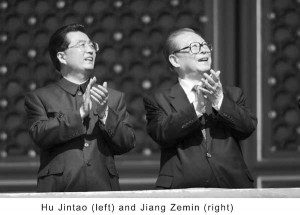China has the most opaque political system in the world. The only way to guess what is going on behind the walls of Zhongnanhai (residences-cum-offices of the top Chinese leadership) is to watch the public appearances of the Communist leaders.
One occasion, and an important one, was the 60th anniversary of the founding of the People’s Republic of China (PRC) on October 1.
 President Hu Jintao and his colleagues had to show to the Chinese people and the world that the People’s Republic (and the Party) was powerful, very powerful.
President Hu Jintao and his colleagues had to show to the Chinese people and the world that the People’s Republic (and the Party) was powerful, very powerful.
Commentators said that the parade was China’s largest-ever military display; perhaps even the world’s largest. China watchers also knew that for Hu, it was the culmination of his mandate after the successful organization of Olympic Games in the summer of 2008.
But the surprise sprang from another quarter: the return of former President Jiang Zemin on the political stage. Indeed, it was to the center stage: Jiang stood next to President Hu, with the eight other members of the Standing Committee of the Politburo (the bosses of 1.3 billion Chinese) on his right and on his left.
The Malaysian Insider called it the ‘talk of the town’: “As the China Central Television (CCTV) programme was meticulously scripted by the Chinese Communist Party (CCP), with screen time of leaders carefully apportioned according to hierarchy, China watchers wondered if that meant Jiang still cast a long shadow over his successor, Hu Jintao. … The cameras panned to the 83-year-old former leader whenever there was a mention on the history of the party and the contributions of past leaders. … While observers ruled out a fresh round of vicious elite struggles within the party, they believed that Jiang’s prominence raises questions of factional tussles in the three years leading up to 2012, when Hu, 66, is slated to retire.”
The power struggle has already started.
Willy Lam of the Jamestown Foundation commented: “Jiang, who no longer holds any official position, appeared on CCTV’s live broadcast of the show more than 20 times. …Jiang was just one step behind Hu – and way ahead of the eight other serving members of the Politburo Standing Committee. In a manner that rendered inevitable Jiang’s place as second in the pecking order, the People’s Daily put two equally big pictures of Hu and Jiang on the front page in its October 2 edition.”
Chow Chungyan and Minnie Chan wrote: “Political power grows out of the barrel of a gun, Mao Zedong once famously said. Sixty years after the founding of the Peoples Republic, many of Maos other teachings have been forgotten and forsaken “” but not this one.
This appearance of the ex-Chairman of the all-powerful Central Military Commission (CMC) comes a week after the news spread that Vice-President Xi Jinping had not made it to the CMC. The Associated Press spoke of: “the mystery surrounding the expected appointment of China’s vice president to a powerful military commission deepened”. All this is an indication of important changes in the power balance in China.
Vice-President Xi Jinping had been widely expected to join Hu Jintao on board with the other 10 CMC members. This was supposed to be part of an elaborate procedure which would take Xi to the top of the Middle Kingdom by 2012, with three hats on his head: General-Secretary of the CCP, President of the Republic and Chairman of the CMC.
Christopher Bodeen wrote for AP: “The lack of word on an appointment underscores how opaque the inner workings of the 75 million-member ruling party remain, despite frequent calls for greater openness and intraparty democracy. Information on top leadership positions is tightly held and China’s entirely state-controlled media almost never report on such matters prior to a formal announcement.”




